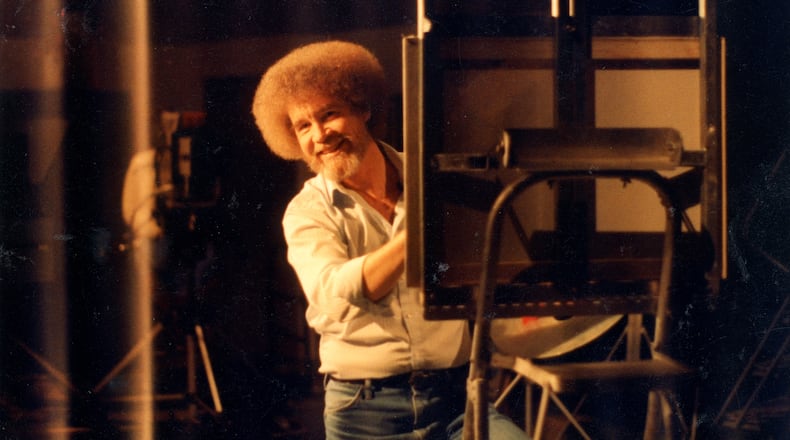The new documentary “Bob Ross: Happy Accidents, Betrayal & Greed,” premiered this week on Netflix, and as the title suggests, the film reveals a painful and scandalous backstory to the beloved pop culture icon.
Ross, the soft-spoken painter whose PBS show “The Joy of Painting” ran for 31 seasons from 1983 to 1994, died of lymphoma in 1995 at the age of 52.
The Netflix docudrama, which runs for 1 hour and 32 minutes, mostly centers on Ross’ former business partners, Annette and Walt Kowalski, who gained control of the rights to his company after the artist passed away.
Today, Ross’ name and image have grown into a lucrative multinational business worth a fortune that his immediate family remains locked out of.
“What they did was shameful, and people should know that,” Ross’ son Steve says of the Kowalskis in the film, according to a review of the film by The Washington Post.
The documentary stands in stark contrast to the peaceful undertones of Ross’ show, which has found a new audience among a younger generation of digital streamers.
Spoiler alert: Here are some of the most breathtaking details revealed in the hot new documentary that everyone’s buzzing about.
A lady’s man
Before “The Joy of Painting,” Ross spent 20 years in the Air Force and wanted desperately to shed a tough-guy persona.
He finally found his niche and a new beginning in the world of art.
The easygoing charm and polite bedside manner that became the hallmark of his TV show reflected his posture in real life, but he carefully crafted this warm approach in an effort to appeal to women viewers, the documentary reveals.
“A lot of the audience is women, so maybe I’ll try to whisper,” his son Steve recalls about his father’s musings in the film.
Credit: TNS
Credit: TNS
With his hair permed into a trademark afro and a voice that soothed like a disarming whisper, Ross became instantly likable as he taught generations of audiences how to paint “happy little clouds.”
If you messed up at home, those weren’t mistakes but were instead “happy accidents.”
“He was trying to be a little sexy,” his son Steve reveals in the film. “The Bob you see on TV is pretty darn close to his real attitude, about nature and about everything, really.”
Rumors of an affair
As Ross’ show became more popular, his smooth style eventually gained the adoration of many new female fans, including his future business partner Annette Kowalski, according to Steve Ross.
Kowalski met Ross at one of his instructional painting workshops in 1982 after her son died.
In one scene provided from archived footage, she tells Ross, “I don’t know what you’ve got, but I think we ought to bottle it and sell it.”
Those close to Ross at the time believed the Kowalskis saw Ross as a goldmine whereas the placid painter was simply enjoying the simple life.
Ross was married at the time, and at one point the two families moved in together. Annette Kowalski also made special guest appearances on several episodes of the TV show, which ultimately led to rumors of an affair that Ross’s son confirmed in the documentary.
“There was an affair between my father and Annette, yes,” he says, adding that he once overheard an argument between his father and stepmother Jane, who died in 1992.
The Kowalskis, who declined to be interviewed for the documentary, said through their attorney that an affair never happened and denied that there was ever any breach of trust between themselves and Ross and his wife.
Turmoil erupts over legacy
Ross was diagnosed with non-Hodgkin’s lymphoma just weeks after his wife died, but he refused to step away from the show. One friend in the documentary speculates that the paint thinners Ross used in his work may have exposed him to the cancer.
As the condition worsened, Ross’ son Steve said he faced increasing pressure to take over as host of the show, which led to “a power struggle between” he and his father and eventually the two stopped speaking for more than a year.
They eventually patched things up, but it was apparent that Ross did not have much longer to live. It was around this time that the Kowalskis approached Ross’ son about getting his father to sign a “memorial agreement,” he said.
“It looked to me like they were trying to get Bob to sign his name over to them,” Steve says in the film, alleging the couple also tried to strongarm Bob Ross into signing away his rights while he was on his deathbed.
“You could hear him screaming, ‘I’m not giving you my name,’ " Steve claims in the documentary.
Steve also alleges that the Kowalskis did not attend his father’s funeral and that they wanted the public “to believe that he was still alive.”
His dying wish?
After Ross died, the Kowalskis took over Bob Ross Inc., which syndicated “The Joy of Painting” around the world.
Several insiders at the company gave interviews in the documentary accusing the couple of forgeries, theft of intellectual property and double-dealing business practices.
Ross’ dying wish was for his family to maintain the rights to his name, likeness and the company. Steve reveals in the film that his father married a nurse in his final days who would help him to achieve this, but that the Kowalskis filed a lawsuit against her and Ross’ half brother Jimmie Cox, over the matter.
Steve, in turn, sued the Kowalskis in 2017 after he learned Ross had originally signed over the property rights to him and Cox years before.
Meanwhile, Cox allegedly went behind Steve’s back and signed over all his rights to the company “totally against my father’s wishes,” Steve says in the film.
In 2019, a court ruled against Steve’s legal claim to Ross’ empire, meaning he cannot profit from his father’s name or image, which remains a lucrative business.
The Kowalski family denies it stole anything from Ross as Steve claims.
“Bob Ross may not have shared the inherent structural features of his company with family and friends — which are very common in small private companies — resulting in many of the unsubstantiated accusations made in the film,” according to The Washington Post, which cited a report by Esquire magazine.
About the Author
The Latest
Featured




